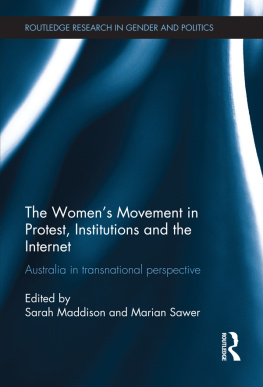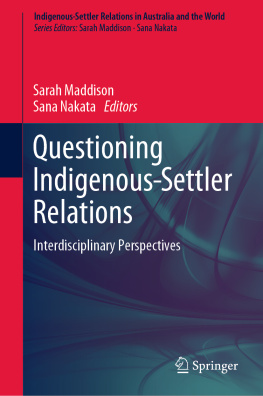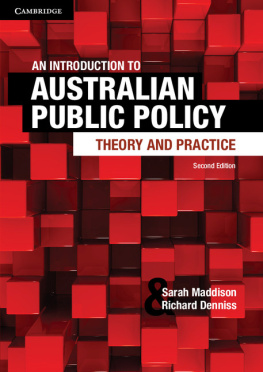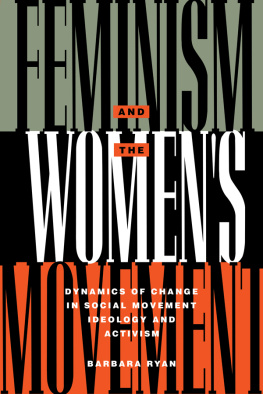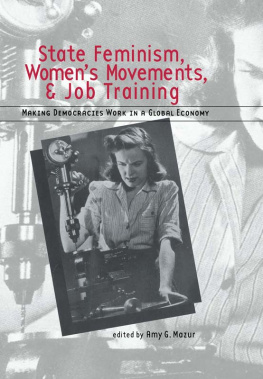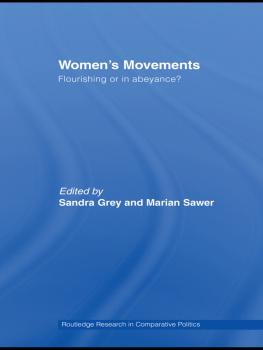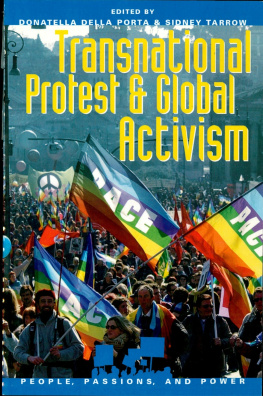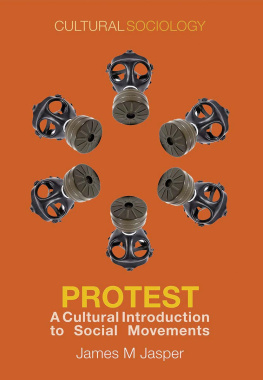This is the most authoritative text on the state of the women's movement written in well over a decade. A must read for anyone who doubts the continued existence of feminism, these meticulously researched and magnificently written essays, reveal that it is alive, thriving, and changing.
Verta Taylor, Professor and Chair of Sociology, University of California, USA.
No, feminism is not dead! This collection of vibrant scholarship, using a wealth of data, makes the case clearly and strongly that feminism continues to mobilize and build new institutions. It effectively contributes perspectives from Australia to the global debates.
Sylvia Walby, Distinguished Professor of Sociology and UNESCO Chair in Gender Research, Lancaster University, UK, and author of The Future of Feminism Polity 2011.
The Women's Movement in Protest, Institutions and the Internet
The death of feminism is regularly proclaimed in the West. Yet at the same time feminism has never had such an extensive presence, whether in international norms and institutions, or online in blogs and social networking campaigns. This book argues that the women's movement is not over; but rather social movement theory has led us to look in the wrong places.
This book offers both methodological and theoretical innovations in the study of social movements, and analyses how the trajectories of protest activity and institution-building fit together. Rich empirical study, together with focused research on discursive activism, blogging, popular culture and advocacy networks, provides an extraordinary resource, showing how women's movements can survive highs and lows and adapt in unexpected ways. Expert contributors explore the ways in which the movement is continuing to work its way through institutions, and persists within submerged networks, cultural production and in everyday living, sustaining itself in non-receptive political environments and maintaining a discursive feminist space for generations to come. Set in a transnational perspective, this book traces the legacies of the Australian women's movement to the present day in protest, non-government organisations, government organisations, popular culture, the Internet and SlutWalk.
The Women's Movement in Protest, Institutions and the Internet will be of interest to international students and scholars of gender politics, gender studies, social movement studies and comparative politics.
Sarah Maddison is Associate Professor and Australian Research Council Future Fellow at the University of New South Wales, Australia.
Marian Sawer is Emeritus Professor in the School of Politics and International Relations at the Australian National University, Canberra, Australia.
Routledge research in gender and politics
The Women's Movement in Protest, Institutions and the Internet
Australia in transnational perspective
Edited by Sarah Maddison and Marian Sawer
The Women's Movement in Protest, Institutions and the Internet
Australia in transnational perspective
Edited by Sarah Maddison and Marian Sawer
First published 2013
by Routledge
2 Park Square Milton Park Abingdon Oxon OX14 4RN
Simultaneously published in the USA and Canada
by Routledge
711 Third Avenue, New York, NY 10017
Routledge is an imprint of the Taylor & Francis Group, an informa business.
2013 Sarah Maddison and Marian Sawer for selection and editorial matter; individual contributors their contribution.
The right of Sarah Maddison and Marian Sawer to be identified as the authors of the editorial material, and of the authors for their individual chapters, has been asserted in accordance with sections 77 and 78 of the Copyright, Designs and Patents Act 1988.
All rights reserved. No part of this book may be reprinted or reproduced or utilised in any form or by any electronic, mechanical, or other means, now known or hereafter invented, including photocopying and recording, or in any information storage or retrieval system, without permission in writing from the publishers.
Trademark notice: Product or corporate names may be trademarks or registered trademarks, and are used only for identification and explanation without intent to infringe.
British Library Cataloguing in Publication Data
A catalogue record for this book is available from the British Library
Library of Congress Cataloging in Publication Data
A catalog record has been requested for this book
ISBN: 978-0-415-83090-4 (hbk)
ISBN: 978-0-203-79902-4 (ebk)
Typeset in Times New Roman
by Wearset Ltd, Boldon, Tyne and Wear
Contents
SARAH MADDISON AND MARIAN SAWER
MARIAN SAWER
DRUDE DAHLERUP
SARAH MADDISON
CATHERINE STRONG AND KIRSTY MCLAREN
MARIAN SAWER AND MERRINDAHL ANDREW
MERRINDAHL ANDREW
CATHERINE STRONG AND SARAH MADDISON
FRANCES SHAW
SARAH MADDISON
MYRA MARX FERREE AND CHRISTINA EWIG
MERRINDAHL ANDREW, KIRSTY MCLAREN, FRANCES SHAW AND CATHERINE STRONG
Merrindahl Andrew is Senior Research Associate in the School of Politics and International Relations at the Australian National University. She completed her doctorate at the ANU in 2008 and has published her work in journals including Social Politics, Social Movement Studies and Politics & Gender. She has worked in advocacy organisations in the areas of gender equality, community services and Indigenous rights.
Drude Dahlerup is Professor of Political Science at Stockholm University. She is a Danish citizen and has published extensively on women in politics, electoral gender quotas, women's movements and feminist theory. Among her edited books are The New Women's Movement: Feminism and Political Power in Europe and the USA (Sage, 1986); Women, Quotas and Politics (Routledge, 2006) and Breaking Male Dominance in Old Democracies (Oxford University Press, 2013). She has been a consultant on gender quota systems in Sierra leone, Cambodia, Kosovo and Tunisia and a member of UN Women's global Civil Society Advisory group.
Christina Ewig is Associate Professor in the Departments of gender & Women's Studies and Political Science at the University of Wisconsin-Madison. her research centres on gender, race and the politics of inequality in latin America. her book, Second-Wave Neoliberalism: Gender, Race and Neoliberal Health Sector Reform in Peru (Penn State Press, 2010) was the 2012 winner of the Flora Tristn book award for best book on Peru from the latin American Studies Association. She edits the book series Crossing Boundaries of gender and Politics in the global South for Palgrave Macmillan.
Myra Marx Ferree is the Alice h. Cook Professor of Sociology and Director of the european Union Center of excellence at the University of Wisconsin-Madison. She is the author of Varieties of Feminism: German Gender Politics in Global Perspective (Stanford University Press, 2012), and co-editor with Aili Mari Tripp of Global Feminism: Women's Organizing, Activism and Human Rights (New York University Press, 2006) and with both Aili Tripp and Christina ewig of Gender and Human Security: New Feminist Perspectives

